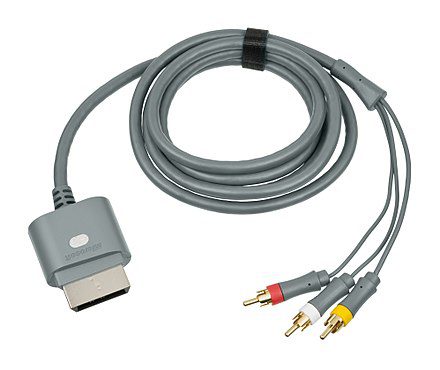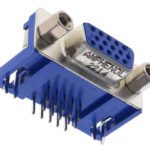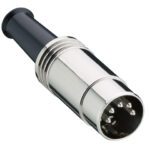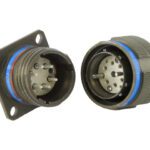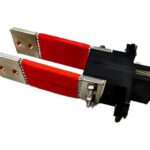What is a RCA Connector?
Those colorful connectors behind our TVs, DVD players, stereo equipment, and gaming consoles have been around for nearly a century.
Meet the Connector: RCA Connectors
The RCA connector is a type of electrical connector comprised of a male plug (RCA plug) and a female jack (RCA jack) used to carry audio and video signals. It is named for the Radio Corporation of America, the company that introduced the design in the 1930s. Its original purpose was to connect a phonograph turntable to a radio receiver and, as such, it is also called RCA phono connector.
RCA connectors are inexpensive to produce and easy to install. They are used to transfer video and audio signal as well as digital S/PDIF (Sony/Philips Digital Interface) signals. Because they are susceptible to electromagnetic interference (EMI), they are only used for short distances. Using individual cables for each signal or using shielded cables can alleviate EMI to some degree.
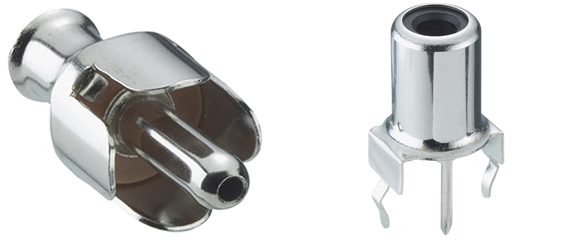
Lumberg’s RCA connectors. RCA plug 1570-01, straight version, with solder terminals (left) and RCA chassis socket 1571-01 acc. to JEITA RC-5231, upright version, for printed circuit boards.
RCA jacks are frequently used to connect audio equipment to the phono inputs of a preamp, mixer, or amplifier.
Originally introduced as an internal connector, by the late 1930s RCA moved the female connector to the rear panel of desktop AM radio models, allowing customers to easily attach an external phonograph or television. The connector was labeled Victrola, Phono, Pick-up, or Television, and, later, 45 RPM. RCA connectors began to replace the older quarter-inch phone connectors in other consumer audio applications in the 1950s, when component high-fidelity systems began gaining popularity.
The RCA connector has been adopted for use as a DC power connector, as an RF connector, for composite video signals, and to carry S/PDIF-formatted digital audio.
Design Notes for RCA Connectors
Connection method: The cable’s plug is pushed into the jack on the device.
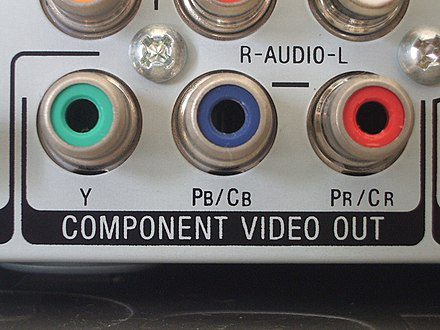
RCA female jacks used for YPbPr component video output. (E3uematsu at Japanese Wikipedia CC BY-SA 3.0)
Color-coding: Plugs and jacks are color-coded to simplify the connections for consumers. Standard colors (listed below) are found on most commercially made products. Variation is acceptable as long as the cable is compatible with the application (e.g., cables with 75 ohms impedance for video and S/PDIF) and in many cases the color schemes have been simplified.
- Composite analog video – yellow.
- Analog audio – white, red, black, yellow, green, blue, gray, brown, tan, and purple depending on specific function.
- Stereo audio – red for right audio channel; white or black for left audio channel (typically found on the back of audio and video equipment). TVs have multiple sets to allow additional connections to portable video sources such as camcorders and to video game consoles.
- Digital audio S/PDIF – orange
- Component analog video (YPBPR) – green, blue, red
- Component analog video/VGA (RGB/HV) – red, green, blue, yellow, white
Standard: Cables should meet the S/PDIF specification as defined by the international standard IEC 60958-3 for assured performance.
Dimensions: The center pin of the male plug is 3.175 mm (1/8”) in diameter and is surrounded by an outer shell which is 8.25 mm (1/3”) in diameter.
Grounding issue: The signal-carrying pin, which protrudes from the plug, frequently makes contact with the socket before the grounded rings meet. If the audio components are powered when they connect but do not have a common ground, the result is a loud hum or buzz. If the ground connection is broken by the plug partially disconnecting from the jack, breaking the ground connection but not the signal, continuous noise can occur.
Other names: RCA phono connector, phono connector, Cinch connector
Applications: Audio/video equipment
Suppliers
Digi-Key, Lumberg, Mouser (Neutrik), Mouser (CUI), RS (Switchcraft),
Like this article? Check out our other Meet the Connector, our Consumer Market Page, and our 2023 and 2022 Article Archive.
Subscribe to our weekly e-newsletters, follow us on LinkedIn, Twitter, and Facebook, and check out our eBook archives for more applicable, expert-informed connectivity content.
- Sealing Success: Overmolding for More Secure Connections - April 23, 2024
- Medical Cable Assemblies Product Roundup - April 23, 2024
- Mezzanine Connectors Product Roundup - April 16, 2024
